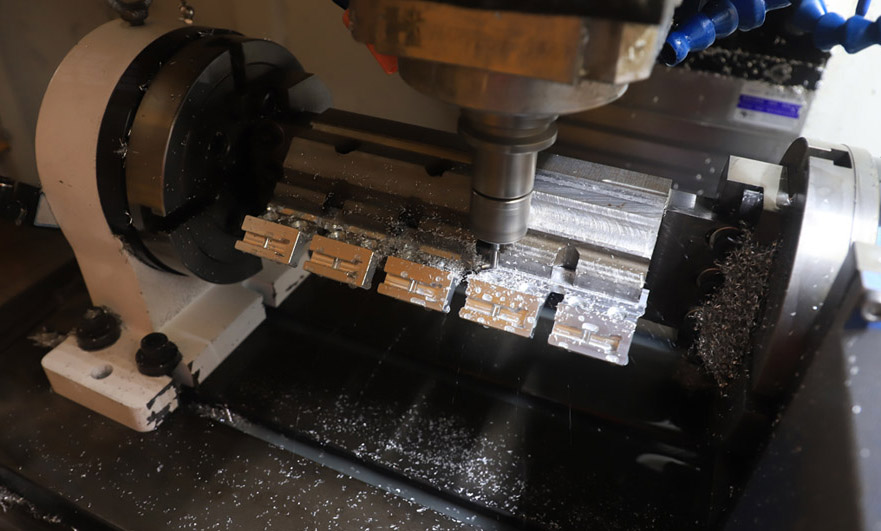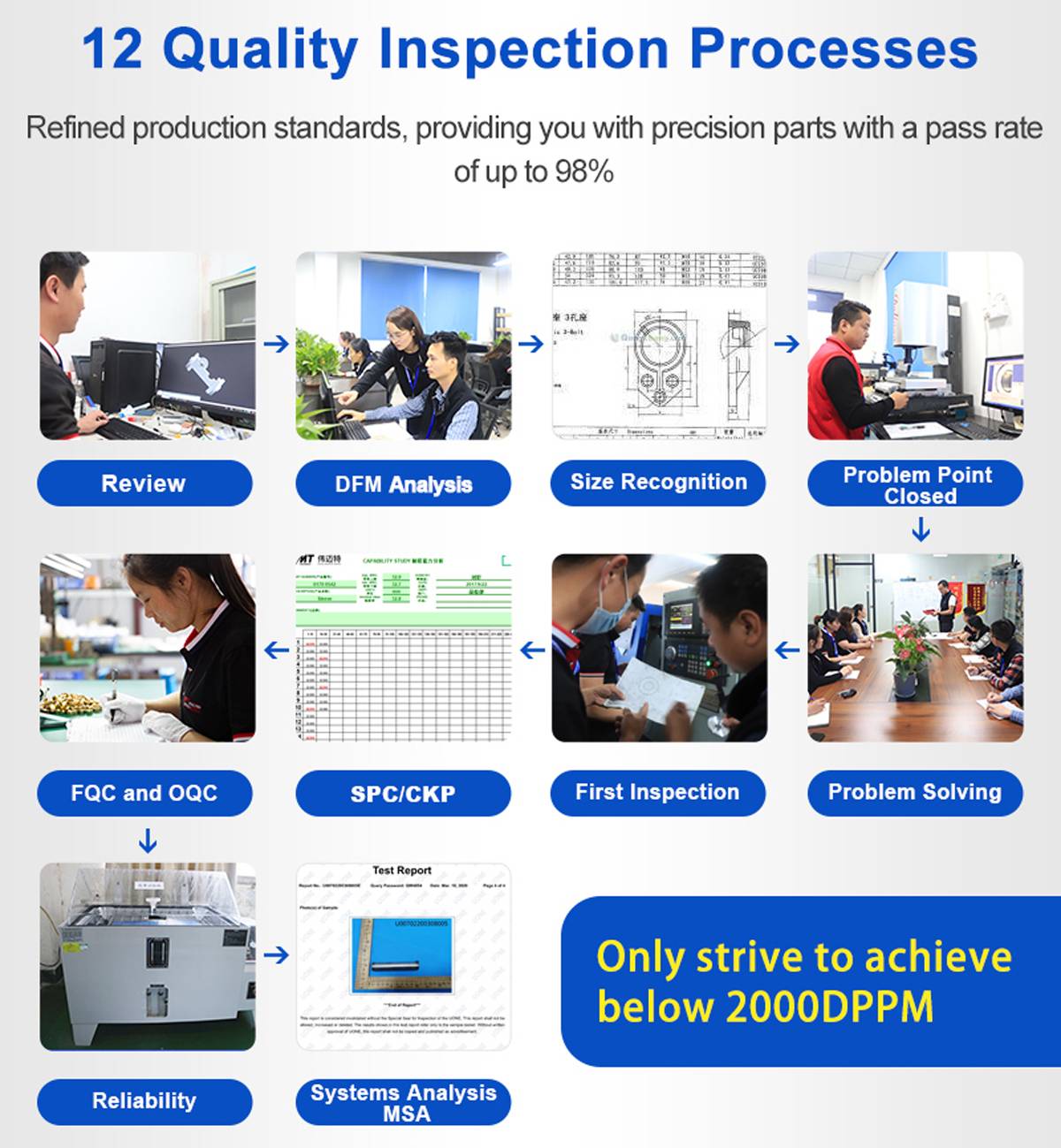15 years one-stop China custom CNC machining parts factory

Hey there I’m VMT Sam!
With 25 years of CNC machining experience we are committed to helping clients overcome 10000 complex part-processing challenges all to contribute to a better life through intelligent manufacturing. Contact us now
 107 |
Published by VMT at Feb 01 2024
107 |
Published by VMT at Feb 01 2024
Introduction:
In the realm of CNC machining manufacturing, guaranteeing the stability and timely delivery of stainless steel CNC machined parts is of paramount importance. Unstable deliveries or delays can adversely affect customer production plans, reduce customer satisfaction, and potentially lead to order loss. This article explores a series of measures to enhance the delivery stability and on-time delivery rate of stainless steel CNC machined parts.

I. Optimize Production Planning and Scheduling:
Accurate Demand Prediction:
Collaborate closely with the sales department to accurately predict customer demand, enabling the preparation of materials and planning of production schedules in advance.
Develop Reasonable Production Schedules:
Based on customer orders and forecasted demand, create detailed production schedules and allocate resources appropriately to ensure production progresses as planned.
Dynamic Plan Adjustments:
Monitor deviations between actual progress and planned schedules during the production process. Adjust plans promptly to accommodate changes as needed.
II. Strengthen Supply Chain Management:
Optimize Supplier Selection:
Choose suppliers with stable supply capabilities and excellent reputations. Establish long-term partnerships to ensure timely supply of raw materials.
Strict Control of Raw Material Quality:
Conduct quality inspections on incoming raw materials to ensure compliance with process requirements. Promptly handle non-conforming materials to prevent them from entering the production process.
Real-Time Inventory Monitoring:
Establish an inventory management system to monitor real-time levels of raw materials and semi-finished products. Replenish inventory when it approaches safety thresholds to avoid production delays due to shortages.
III. Enhance Production Process Stability:
Standardize Operations:
Develop standardized operating procedures to ensure production personnel strictly adhere to defined processes. Through training and regular assessments, elevate employee skill levels and commitment to responsibilities.
Introduce Advanced Production Equipment:
Invest in advanced CNC machining and inspection equipment to enhance production efficiency and product quality. Ensure proper maintenance of equipment to minimize downtime due to malfunctions.
Continuous Process Improvement:
Continuously improve and optimize process workflows based on actual production conditions. Introduce new processes, materials, or cutting parameters to enhance production efficiency and product quality.
Preventative Maintenance and Rapid Fault Response:
Establish a preventative maintenance plan for equipment, conducting regular inspections and maintenance. Simultaneously, implement a mechanism for rapid response to faults, ensuring swift repair or replacement when equipment malfunctions occur.

IV. Implement a Comprehensive Quality Management System:
Establish Strict Quality Standards and Control Procedures:
Develop detailed quality standards and control procedures in accordance with customer requirements and industry standards. Ensure compliance with quality requirements throughout the entire process from raw materials to finished products.

Strengthen Quality Inspection:
Set up quality inspection points at critical production stages, rigorously inspecting semi-finished and finished products. Identify, label, isolate, and address non-conforming products to prevent them from progressing to the next production stage or being delivered to customers.
Data Analysis and Continuous Improvement:
Collect quality data during the production process, conduct in-depth analysis to identify potential issues and improvement opportunities. Develop improvement measures for identified problems, track their effectiveness, and continuously optimize product quality and production processes.
Periodic Evaluation and Audits:
Regularly conduct self-assessment and third-party audits of the quality management system to ensure its effectiveness and compliance. Undertake corrective actions and optimizations based on evaluation results to continually enhance the quality management level.
Enhance Communication and Feedback with Customers:
Maintain close communication with customers' sales and technical departments, staying informed about customer needs and market feedback. Incorporate customer opinions and suggestions into quality improvement plans to continually enhance customer satisfaction.
V. Strengthen Information Management:
Implement Production Management Systems:
Introduce advanced production management systems (such as ERP, MES, etc.) for digitized management and real-time monitoring of the production process. Enhance production plan accuracy and executability through automated scheduling.
Data Integration and Sharing:
Break down data barriers between various information systems to achieve data integration and sharing. Utilize real-time data collection and analysis to provide robust support for decision-making, improving the efficiency and accuracy of production management.
Reinforce Data Security Measures:
Strengthen information system security measures to ensure data is not illegally accessed, tampered with, or leaked. Conduct regular data backups and security audits to safeguard enterprise information and customer privacy rights.
Improve Employee Information Literacy:
Enhance employee information literacy through training, enabling staff to effectively use information tools to solve problems. Encourage employees to explore and apply new technologies and methods in their work to increase efficiency and quality.
Continuous Optimization of Information Systems:
Continuously optimize the functionality and architecture of existing information systems based on enterprise development and actual needs. Introduce advanced technologies and solutions (such as cloud computing, big data analytics, etc.) to continually elevate information management levels and operational efficiency.
Conclusion:
In conclusion, CNC machining manufacturing firms can take a series of measures to ensure the stability and on-time delivery of stainless steel CNC machined parts. By strategically employing a combination of methods such as optimizing production planning, strengthening supply chain management, enhancing production process stability, implementing a comprehensive quality management system, and fortifying information management, manufacturers can increase production efficiency, reduce defect rates, minimize delays, and meet customer demands. These measures contribute to winning customer trust and support, enhancing market competitiveness, and achieving sustainable development goals.
Ready To Start Your Next Project?
Get Instant Quote

Request a Free Quote
Send us a message if you have any questions or request a quote. We will get back to you ASAP!